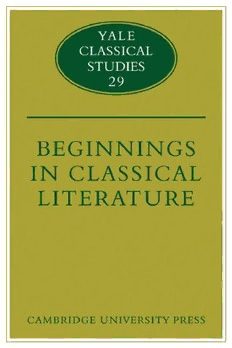
Beginnings in Classical Literature (Yale Classical Studies (No. 29)) PDF
257 Pages·2009·2.872 MB·English
Most books are stored in the elastic cloud where traffic is expensive. For this reason, we have a limit on daily download.
Preview Beginnings in Classical Literature (Yale Classical Studies (No. 29))
Description:
The ways in which literary works begin have proved fascinating to readers and critics at least since Aristophanes. This collection of essays gives life to a topic of perennial interest by presenting a variety of original readings in nearly all the major genres of Greek and Latin literature. The subjects of these essays range from narrative voices in the opening of the Odyssey to ideological reasons for Tacitus' choice of a beginning in the Histories, and from a survey of opening devices in Greek poetry to the playwright's negotiations with the audience in Roman comedy. Other papers discuss 'false starts' in Gorgias and Herodotus, the prologues of Greek tragedy, Plato's 'frame' dialogues, delayed proems in Virgil, the role of the patron in Horace, aristocratic beginnings in Seneca, and 'inappropriate' prefaces in Plutarch. By embracing a variety of authors and a broad range of approaches, from formal analysis of opening devices to post-structural interpretation, these twelve contributions by both younger and established scholars offer an exciting new perspective on beginnings in classical literature.
See more
The list of books you might like
Most books are stored in the elastic cloud where traffic is expensive. For this reason, we have a limit on daily download.
